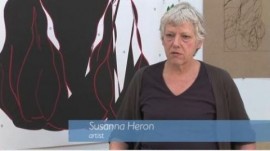
Digital partners
The social media revolution has had a significant impact on the ways artists work. Here we focus on a selection of projects that artists have developed through online collaboration, sourced via our Twitter and Facebook followings.
The social media revolution has had a significant impact on the ways artists work. Here we focus on a selection of projects that artists have developed through online collaboration, sourced via our Twitter and Facebook followings.
Access to professional development is vital to artists’ careers, so here’s something we think will help.
From subsidised studio and accommodation to one-on-one mentoring sessions, here we spotlight a selection of residencies that provide support to artists across the UK and beyond.
An abridged version of Dany Louise’s follow-up report on small visual arts organisations cut by Arts Council England, six months after her ‘Ladders for development’ enquiry. She asks: how have these organisations fared and what do their futures hold? Read the full version of this report with updates on all surveyed organisations: www.a-n.co.uk/realising_the_value
Exhibition, residency and bursary opportunities for artists across the UK and beyond.
‘Ladders for development’ argues that the visual arts sector should pull together and support small visual arts organisations cut by Arts Council England because they “punch above their weight” and provide vital development of future artists. Six months on, Dany Louise interviews these arts organisations again, to find out how they’ve fared and what their futures hold.
A survey of commissioning projects and public art consultancies around the UK.
In response to Claire White’s letter in the November issue, I want to agree with her analysis of artists and how many find themselves as part of community projects and development.
Since graduating from Leeds University in 2007 Joe Simpson has developed his craft as a painter blending his practice with commissions and more personal projects. With his show ‘Musician Portraits’ open in London, and his portait of Maxi Jazz in the BP Portrait Award 2011, he takes time out to fill us in on his career so far.
Digital capabilities have revolutionised artists’ working practices, from transforming the kind of works they make to how they interact with each other and audiences.
It’s sixteen years since the Disability Discrimination Act came into force; so are disabled artists more in the mainstream now, or have the goal posts just moved sideways asks Emma Geliot.
Highlighting just some of the festivals, events and exhibitions taking place across the North of England this season.
Over the past five years, the words Turning Point have been read, heard, written and spoken with increasing frequency by people in the visual arts in England, but for many individual arts practitioners, in particular, the origins and activities of Turning Point remain a bit opaque. This briefing paper is for them and for anyone interested in understanding more about what Turning Point is and does.
James Rigler, Chatsworth Table, ceramic, marble, wood, steel, gold leaf, rope, 2011. Courtesy: Chatsworth House
News and updates on AIR’s strategies and activities designed to support professional artists within their practice and working lives.
New developments in the gallery sector.
Emily Speed reports from Abandon Normal Devices (AND) – ‘a call to arms inviting anarchists of the imagination to propose striking perspectives on normality’.
Current professional development support schemes for visual artists in the UK.
In 2010 artist Jo Berry embarked on a period of research within the School of Biomedical Sciences at Nottingham University Medical School, alongside Tim Self and Dr Nicholas Holliday. Here they recount the experience of an artist working in a ‘live’ scientific research environment, and the ways that the two disciplines of art and science can benefit each other to a wider audience.
Organisations around the UK facing cuts or closure.
Led by curator Vicki Lewis and artist Katherine Clarke (muf), the We Are Artists, How Can We Help? action research project questions the presence of artists as a model in regeneration. What does the artist gain? Is there a benefit swap between the artist constituency and their neighbours?
Artists are increasingly working with organisations and other artists in collaborative situations where issues of Intellectual Property may be less clear. We asked solicitor Nicholas Sharp for his advice in response to an artist’s recent query.
A selection of post-graduate study routes on offer across the UK.
Artist Susanna Heron talks through her experiences of being commissioned on public art projects, the pitfalls she encounters and how to get around them. Includes an overview on the rights, roles and responsibilities of commissioners and artists.
Becky Shaw explores the dangers of the concept of ‘continuous practice’ and gives thought to the key factors that enable longevity if artists choose it.



















